The following article is part of an ongoing series of analyses based on the recent Asia Matters for America Public and Elite Opinion poll. See all articles in the series here.
For the past few years, climate change has emerged as one of the most debated topics in our society. The importance of this matter has become apparent as we witness more wildfires, floods, and droughts in many parts of the world. Ranging from government officials to average Americans, many have expressed their opinions on whether we should engage more in addressing climate change. Although some demand more action, others overlook this issue.
A recent poll conducted by NORC at the University of Chicago, on behalf of the East-West Center surveyed Americans’ regarding US-Asia relations. The survey consisted of 1055 adults, and 1446 elites[1]. In this survey, Americans were asked their opinion on climate change cooperation with Asian countries. The results show about 40% of the general population and over half of the elites were supportive of increasing US-Asia cooperation in addressing this matter. However, some demographic and political affiliations groups appear to favor more cooperation than others. In particular, Democrats, Asian Americans, Pacific Islanders, American Indian, Alaska Native and Native Hawaiians, high-income households and individuals with high education levels were most likely to agree with increasing “a lot/ a little” cooperation with Asian countries compared to other demographics. As for regional distinctions, respondents from the Southern United States [2] stood out as less supportive of cooperation compared to other regions.
Resource for the Future, a United States-based non-profit that conducts independent research in environmental, energy, and natural resource issues, demonstrated a similar trend. Their survey, from 2000-2020, showed that over half of average Americans and business leaders believe government, business, or average people should do “at least a moderate amount” to deal with climate change.
SHOULD THE UNITED STATES INCREASE, DECREASE, OR KEEP ABOUT THE SAME ITS COOPERATION WITH EACH OF THE FOLLOWING TO COMBAT CLIMATE CHANGE?
Percent of Adults
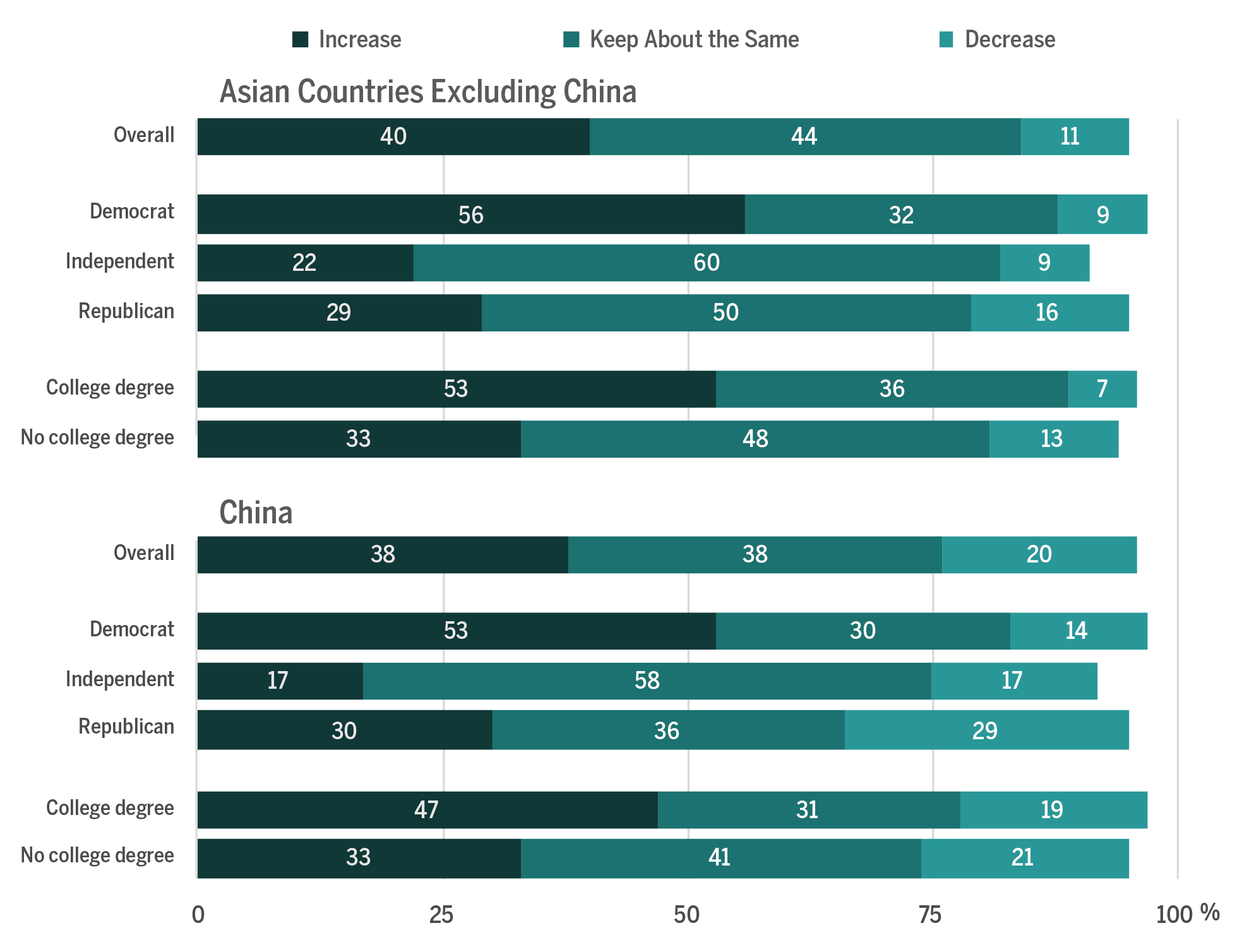
SHOULD THE UNITED STATES INCREASE, DECREASE, OR KEEP ABOUT THE SAME ITS COOPERATION WITH EACH OF THE FOLLOWING TO COMBAT CLIMATE CHANGE?
Percent of Elites
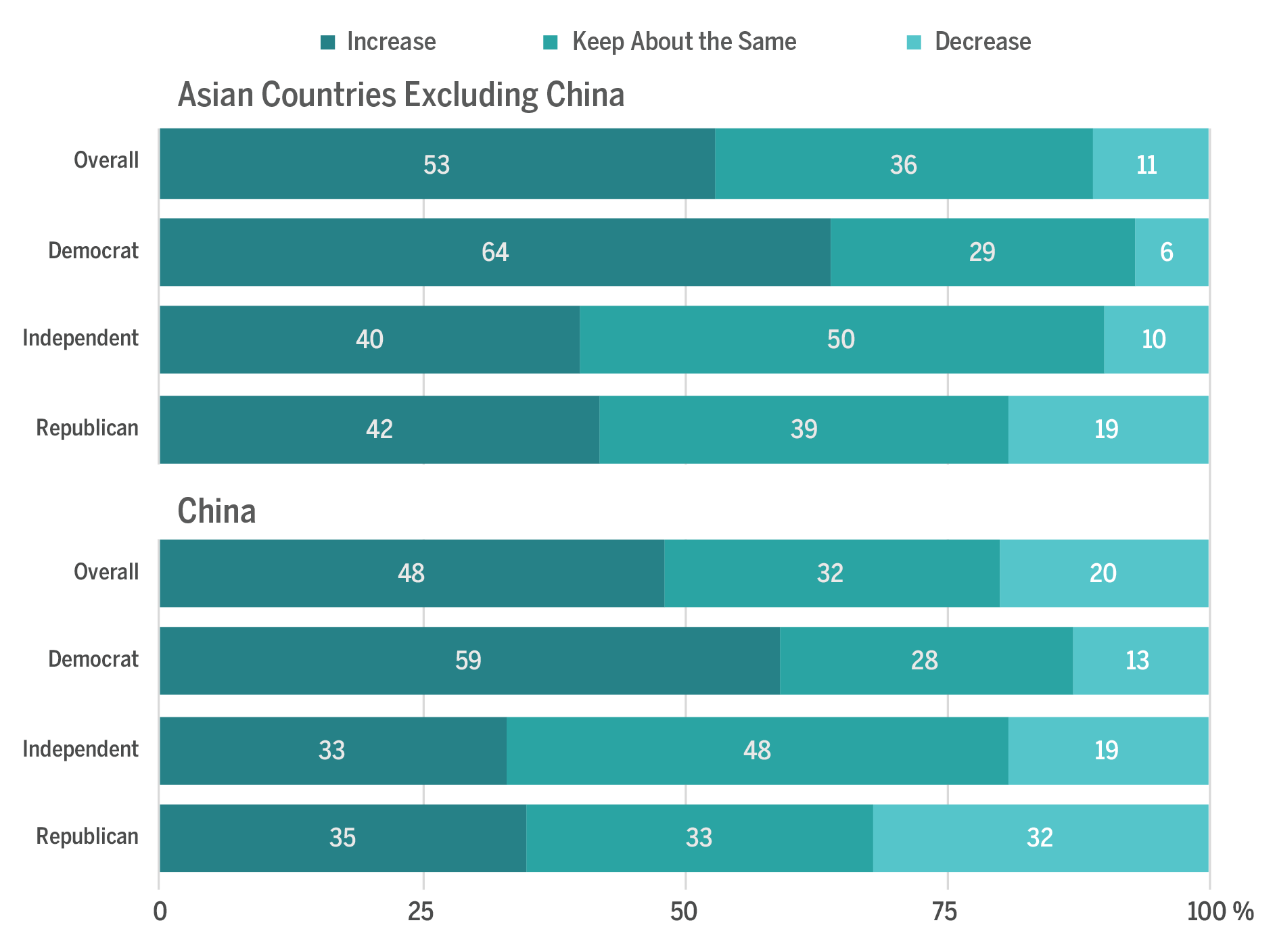
When asked whether to increase cooperation with Asian countries, about 56% of Democrats in the general population responded they agreed with increasing cooperation to address climate issues. On the other hand, only a third of the Republicans said the same. The numbers for the elite populations demonstrate a similar pattern as over half of the Democrats, as opposed to 42% of the Republicans, agreed with the increasing corporation in addressing this issue. Thus, Democrats appear as a political group likely to agree with more US-Asia cooperation to combat climate change compared to Republicans, however, there is a larger constituent of supportive Republicans than possibly expected.
In terms of race/ethnicity, respondents who identified as “Other” tended to favor more cooperation with Asian countries than their counterparts. “Other” is the category that represents the Non-White-Black-Hispanic respondents, which include Asian Americans, Pacific Islanders, American Indian, Alaska Native and Native Hawaiians. Among the general population, about 5 out 10 “Other” respondents agreed with increasing cooperation to fight climate issues. The second group that showed higher interest, although less than “Other”, is the White Non-Hispanic respondents. Within Hispanic and Black Non-Hispanic communities, only about a third expressed the same interest.
LEFT: [ASIAN COUNTRIES EXCLUDING CHINA] SHOULD THE UNITED STATES INCREASE, DECREASE, OR KEEP ABOUT THE SAME ITS COOPERATION WITH EACH OF THE FOLLOWING TO COMBAT CLIMATE CHANGE?
RIGHT: [CHINA] SHOULD THE UNITED STATES INCREASE, DECREASE, OR KEEP ABOUT THE SAME ITS COOPERATION WITH EACH OF THE FOLLOWING TO COMBAT CLIMATE CHANGE?
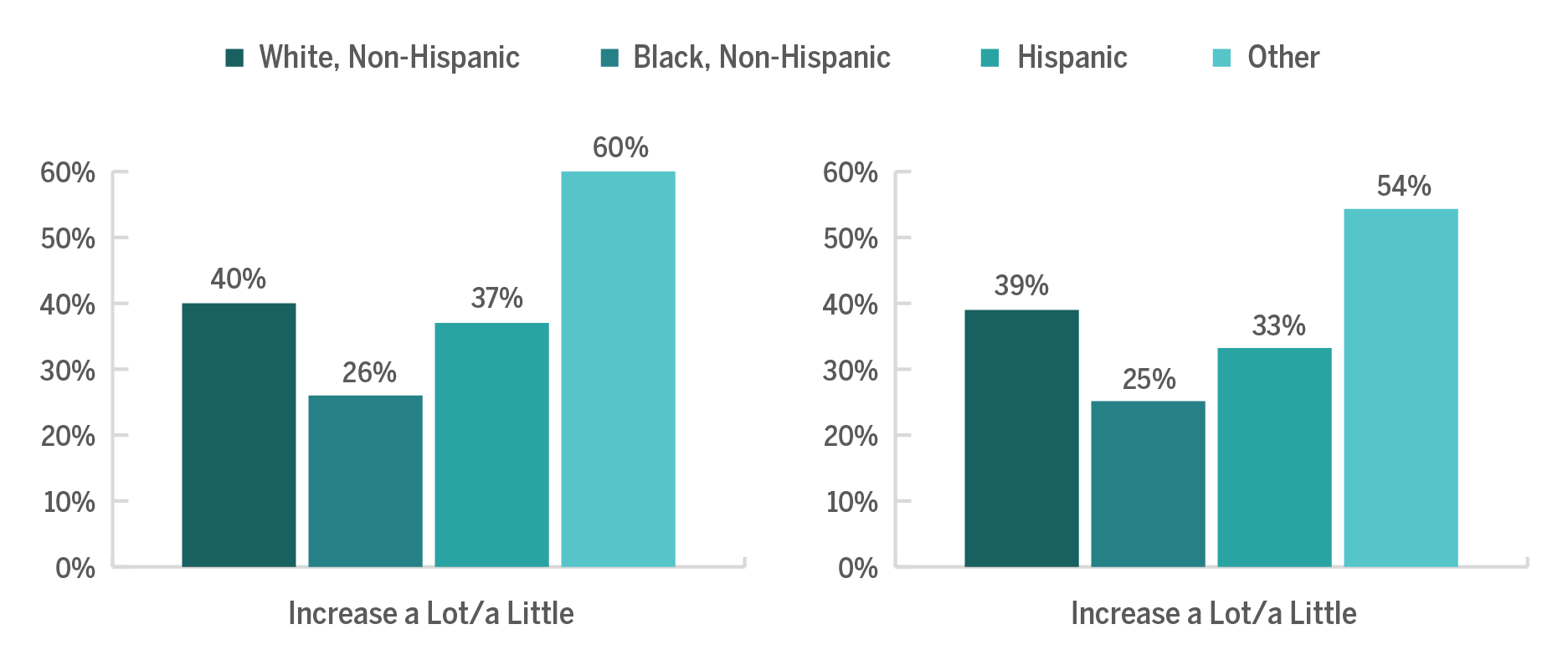
Overall, elites’ interest for increasing cooperation is higher than the general population. In terms of race, elite White Non-Hispanic respondents emerged as the group with the most interest. About half of the White Non-Hispanic and Non-White respondents agreed with increasing work with Asian countries to tackle this issue. It is worth noting that when including China, the interest from White Non-Hispanic respondents dropped lower than the Non-White respondents. Nevertheless, both categories of elites expressed higher interest in increasing cooperation than the general population. Overall, the pattern in this demographics demonstrates that “Other” race/ethnicity respondents and White Non-Hispanic respondents are more likely to agree with cooperation to combat climate change compared to the Hispanic and the Black, Non-Hispanic respondents.
LEFT: [ELITE] [ASIAN COUNTRIES EXCLUDING CHINA]: SHOULD THE UNITED STATES INCREASE, DECREASE, OR KEEP ABOUT THE SAME ITS COOPERATION WITH EACH OF THE FOLLOWING TO COMBAT CLIMATE CHANGE?
RIGHT: [ELITE] [CHINA]: SHOULD THE UNITED STATES INCREASE, DECREASE, OR KEEP ABOUT THE SAME ITS COOPERATION WITH EACH OF THE FOLLOWING TO COMBAT CLIMATE CHANGE?
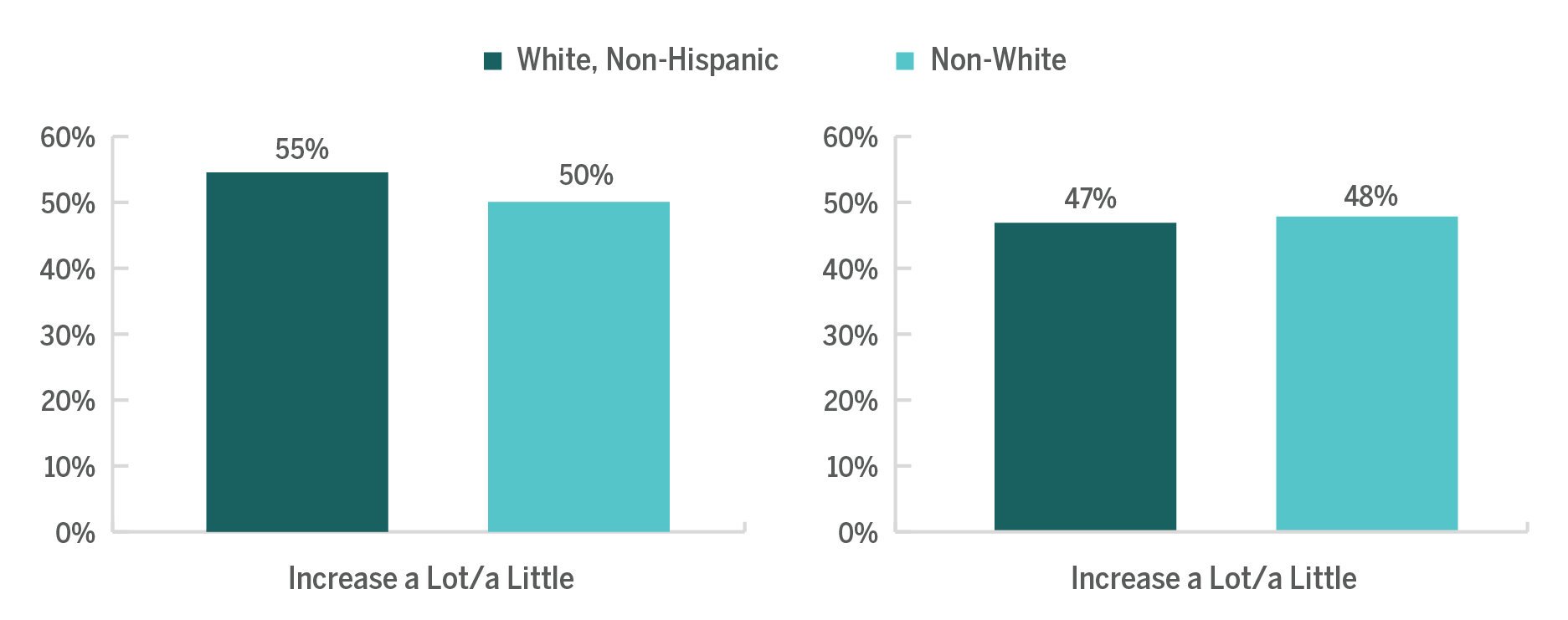
Those who responded Asian Americans share the same values and beliefs as themselves showed a significant interest in increasing "a lot / a little" cooperation with Asian countries in tackling climate change. Meanwhile, only about a third of respondents who believed Asian Americans have different values, agreed with increasing cooperation with Asian countries on climate change. People who saw Asian Americans as having different values and beliefs tended to not support cooperation with Asian countries. As for the elites, the trend is similar. However, the overall interest is higher than the general population.
LEFT: [ASIAN COUNTRIES EXCLUDING CHINA]: SHOULD THE UNITED STATES INCREASE, DECREASE, OR KEEP ABOUT THE SAME ITS COOPERATION WITH EACH OF THE FOLLOWING TO COMBAT CLIMATE CHANGE?
RIGHT: [CHINA]: SHOULD THE UNITED STATES INCREASE, DECREASE, OR KEEP ABOUT THE SAME ITS COOPERATION WITH EACH OF THE FOLLOWING TO COMBAT CLIMATE CHANGE?
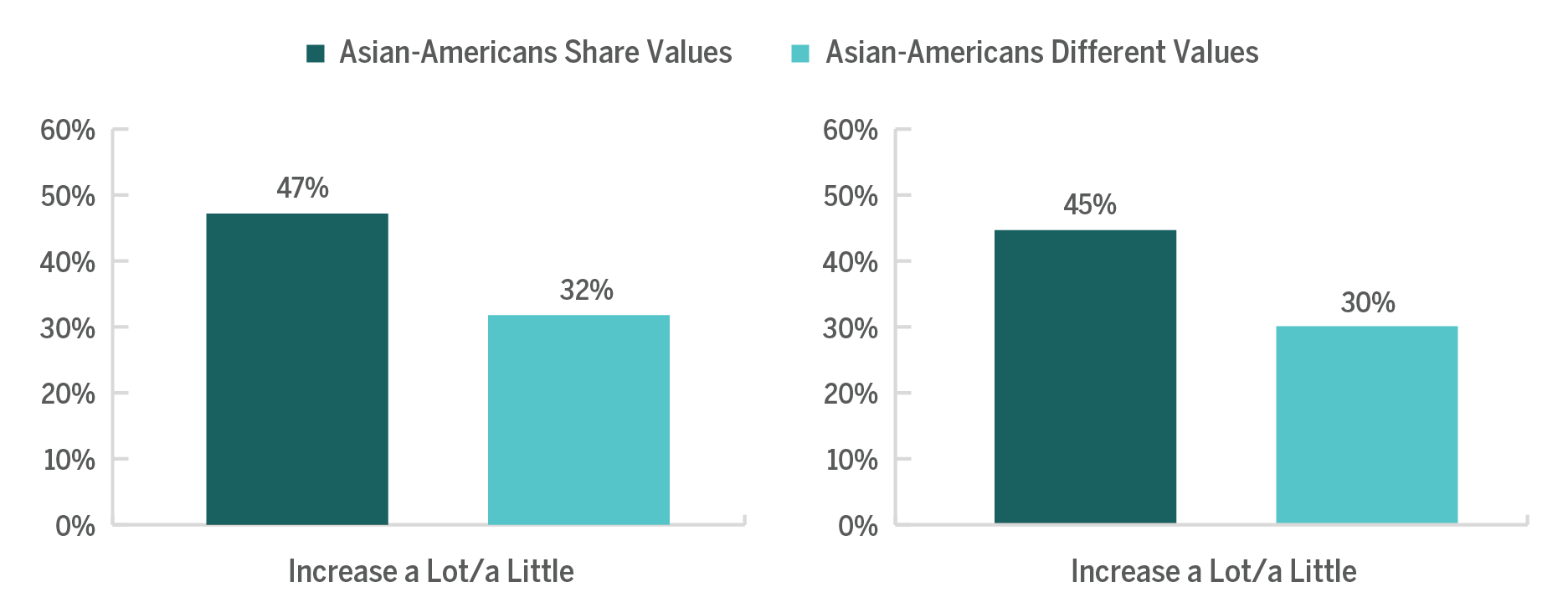
LEFT: [ELITE] [ASIAN COUNTRIES EXCLUDING CHINA]: SHOULD THE UNITED STATES INCREASE, DECREASE, OR KEEP ABOUT THE SAME ITS COOPERATION WITH EACH OF THE FOLLOWING TO COMBAT CLIMATE CHANGE?
RIGHT: [ELITE] [CHINA]: SHOULD THE UNITED STATES INCREASE, DECREASE, OR KEEP ABOUT THE SAME ITS COOPERATION WITH EACH OF THE FOLLOWING TO COMBAT CLIMATE CHANGE?
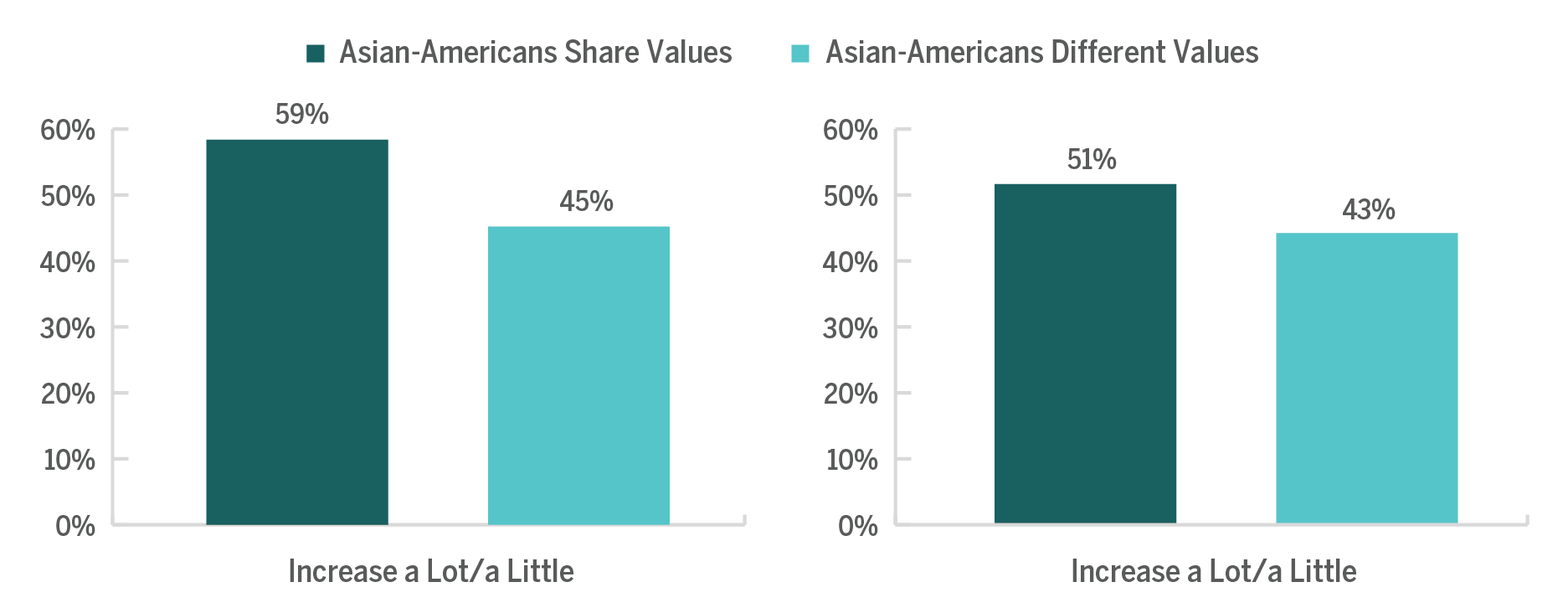
In terms of income, there is an upward trend for US-Asia cooperation in addressing climate issues, with higher income brackets correlating with more agreement for increased cooperation. Over 40% of households that earn more than $60,000 a year agreed with increasing “a lot/ a little” of cooperation with Asian countries. However, only about a third of those who earn less than $60,000 a year, concurred with increasing cooperation. The common trend for income suggests as income rises, the interest for increasing “ a lot/ a little” also rises for the US- Asia cooperation to combat climate change.
LEFT: [ASIAN COUNTRIES EXCLUDING CHINA]: SHOULD THE UNITED STATES INCREASE, DECREASE, OR KEEP ABOUT THE SAME ITS COOPERATION WITH EACH OF THE FOLLOWING TO COMBAT CLIMATE CHANGE?
RIGHT: [CHINA]: SHOULD THE UNITED STATES INCREASE, DECREASE, OR KEEP ABOUT THE SAME ITS COOPERATION WITH EACH OF THE FOLLOWING TO COMBAT CLIMATE CHANGE?
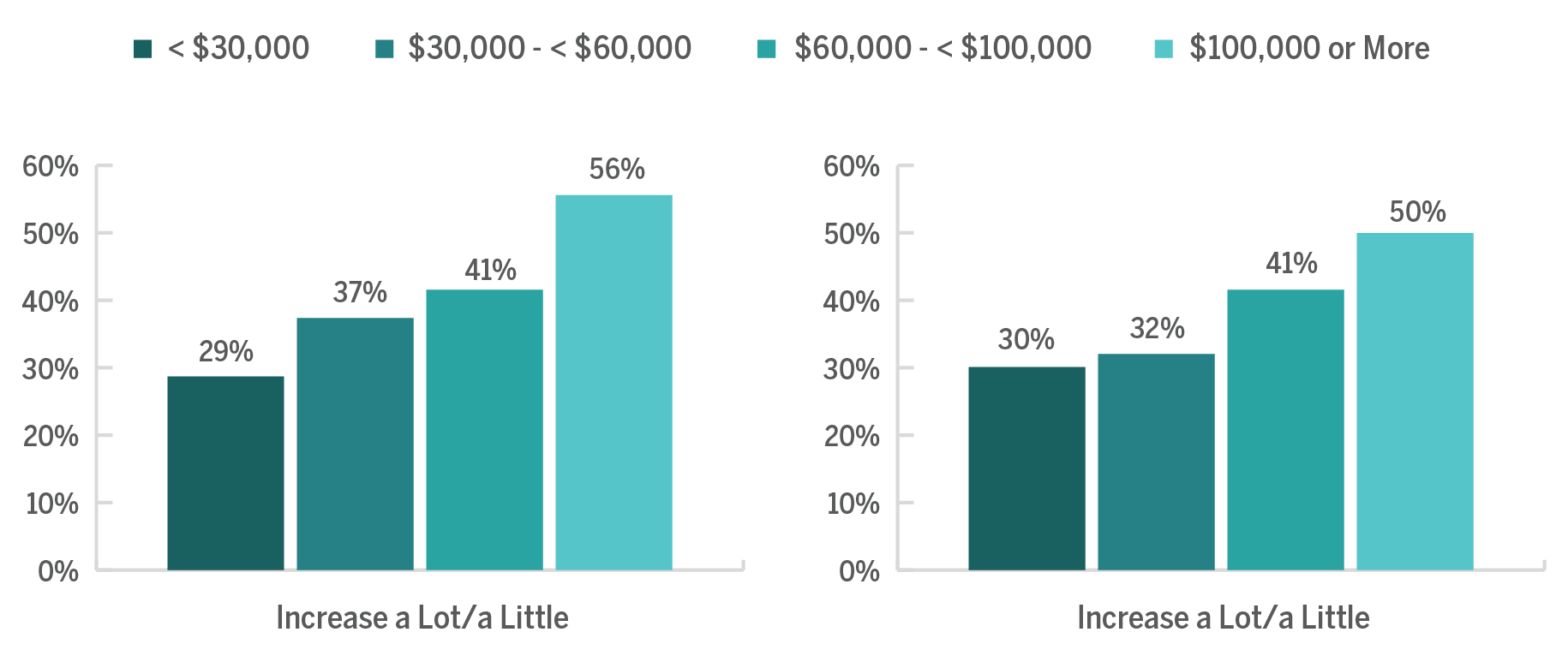
Similarly, for those over the age of 55, both the general population and the elites expressed higher interest for “a lot/ a little” cooperation with Asian countries. However, when including China, the elites overall expressed less interest. However, age does not seem to have had as much of a correlation in climate change cooperation as compared to wealth. These results are surprising, considering most political activism in the United States around climate change is led by young people.
LEFT: [ASIAN COUNTRIES EXCLUDING CHINA]: SHOULD THE UNITED STATES INCREASE, DECREASE, OR KEEP ABOUT THE SAME ITS COOPERATION WITH EACH OF THE FOLLOWING TO COMBAT CLIMATE CHANGE?
RIGHT: [CHINA]: SHOULD THE UNITED STATES INCREASE, DECREASE, OR KEEP ABOUT THE SAME ITS COOPERATION WITH EACH OF THE FOLLOWING TO COMBAT CLIMATE CHANGE?
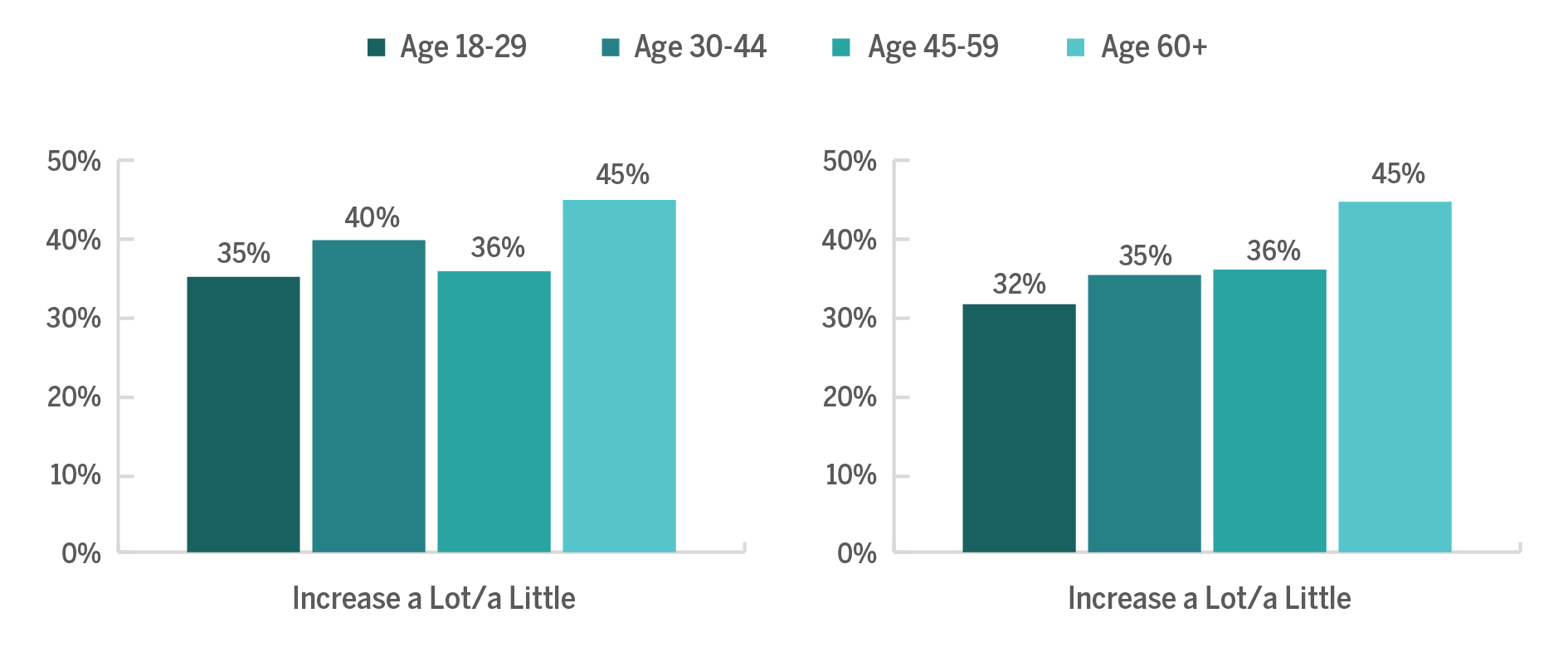
LEFT: [ELITE] [ASIAN COUNTRIES EXCLUDING CHINA]: SHOULD THE UNITED STATES INCREASE, DECREASE, OR KEEP ABOUT THE SAME ITS COOPERATION WITH EACH OF THE FOLLOWING TO COMBAT CLIMATE CHANGE?
RIGHT: [ELITE] [CHINA]: SHOULD THE UNITED STATES INCREASE, DECREASE, OR KEEP ABOUT THE SAME ITS COOPERATION WITH EACH OF THE FOLLOWING TO COMBAT CLIMATE CHANGE?
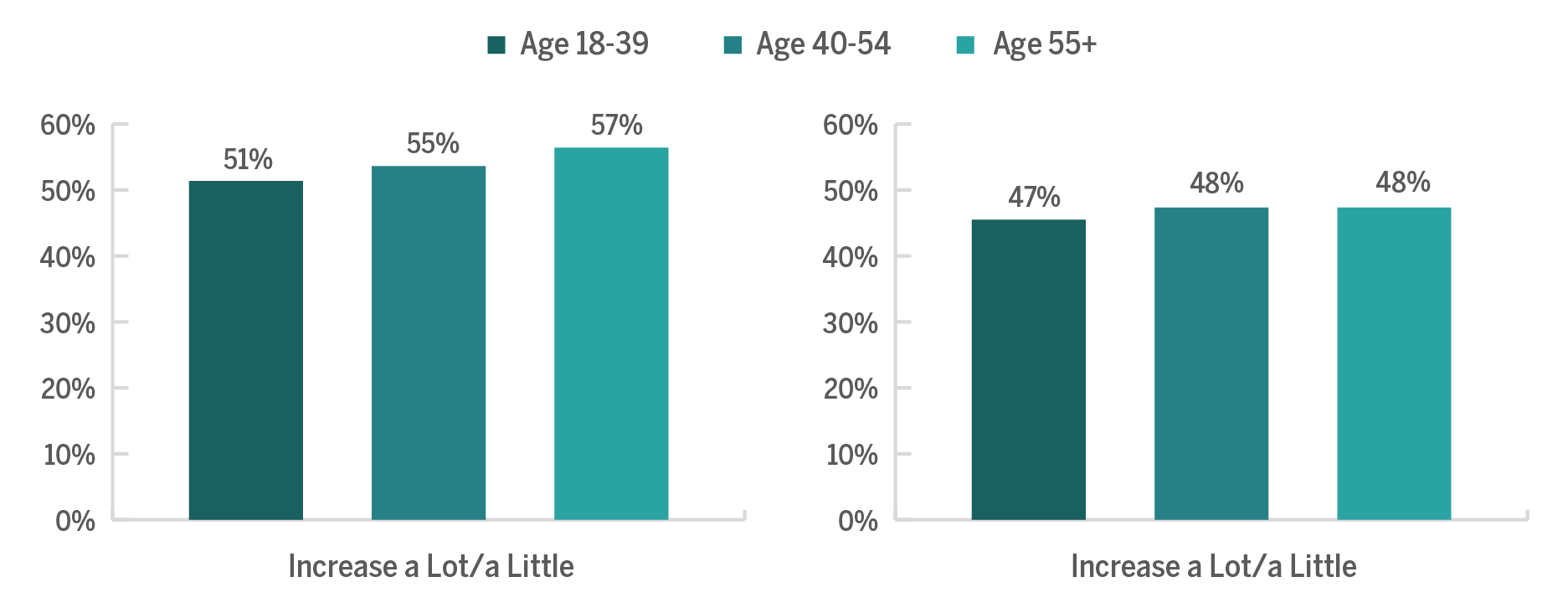
In regards to education, there is also an upward trend for cooperation as the educational level increases. When excluding China, about 53% of those with Bachelor’s degree or higher showed agreement in working with Asian countries to address climate change. Meanwhile, about one-third of those with a few degrees lower, High school or equivalent and Some College or Associates, expressed the same interest. As for those with no high school diploma, only 17% of them were supportive of increased cooperation with Asian countries. This trend persists when including China. Although slightly lower, about 47% of those with Bachelor’s degrees or higher are for cooperation. The upward trend of support in climate change cooperation shows higher education level is correlated with increased support for environmental cooperation.
LEFT: [ASIAN COUNTRIES EXCLUDING CHINA]: SHOULD THE UNITED STATES INCREASE, DECREASE, OR KEEP ABOUT THE SAME ITS COOPERATION WITH EACH OF THE FOLLOWING TO COMBAT CLIMATE CHANGE?
RIGHT: [CHINA]: SHOULD THE UNITED STATES INCREASE, DECREASE, OR KEEP ABOUT THE SAME ITS COOPERATION WITH EACH OF THE FOLLOWING TO COMBAT CLIMATE CHANGE?
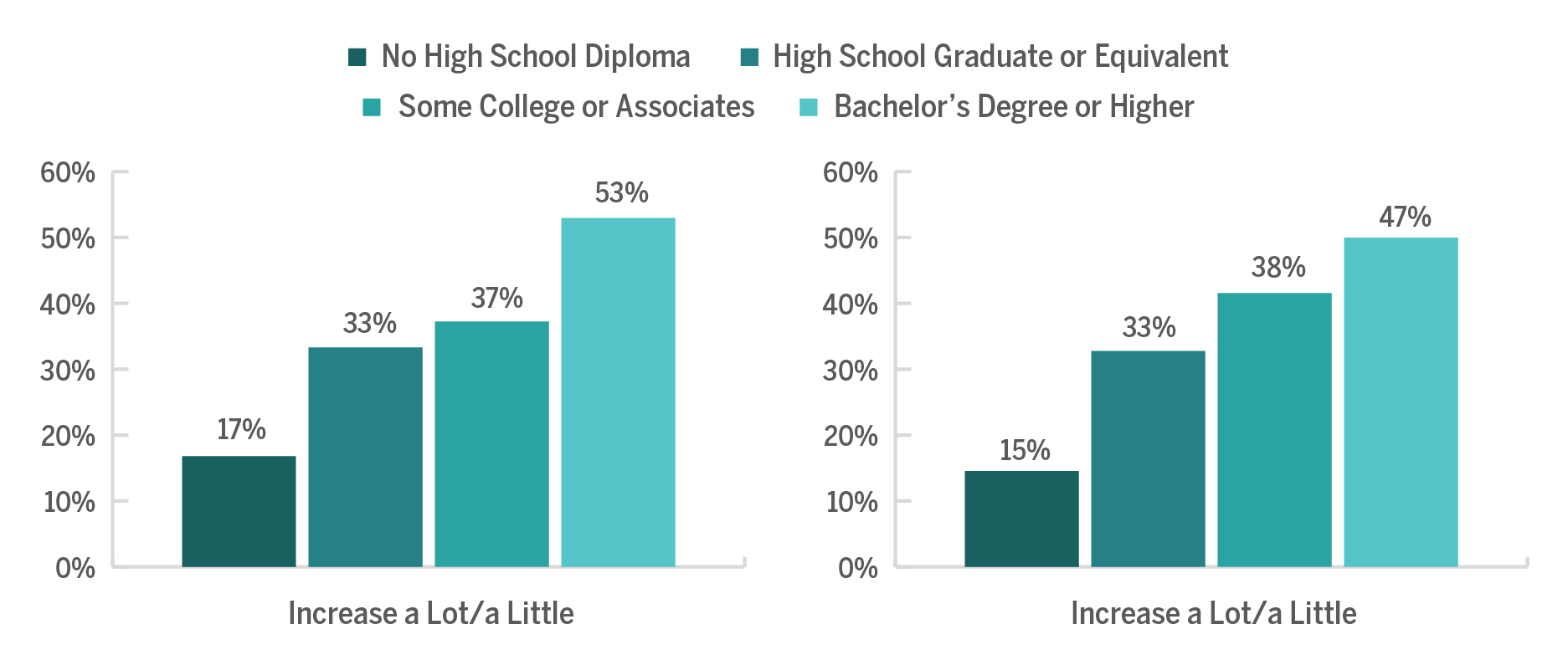
Lastly, respondents from the United States’ West, Midwest and the Northeast showed higher interest in working with Asian countries, including China, compared to those in the South. Respondents who reside in the Western United States emerged as the group with the highest interest, 48% of respondents were supportive of increased cooperation with Asian countries. Following this group, about 40% of the Northeastern and Midwestern respondents expressed the same interest. On the other hand, those in the South showed the least interest in working with Asian countries. Moreover, even fewer respondents in the South supported increased cooperation with China on climate change (29%). The survey indicated those who reside in the West, Northeast and Midwest generally favor increasing “a lot/ a little” of cooperation with Asian countries in addressing climate change.
LEFT: [ASIAN COUNTRIES EXCLUDING CHINA]: SHOULD THE UNITED STATES INCREASE, DECREASE, OR KEEP ABOUT THE SAME ITS COOPERATION WITH EACH OF THE FOLLOWING TO COMBAT CLIMATE CHANGE?
RIGHT: [CHINA]: SHOULD THE UNITED STATES INCREASE, DECREASE, OR KEEP ABOUT THE SAME ITS COOPERATION WITH EACH OF THE FOLLOWING TO COMBAT CLIMATE CHANGE?
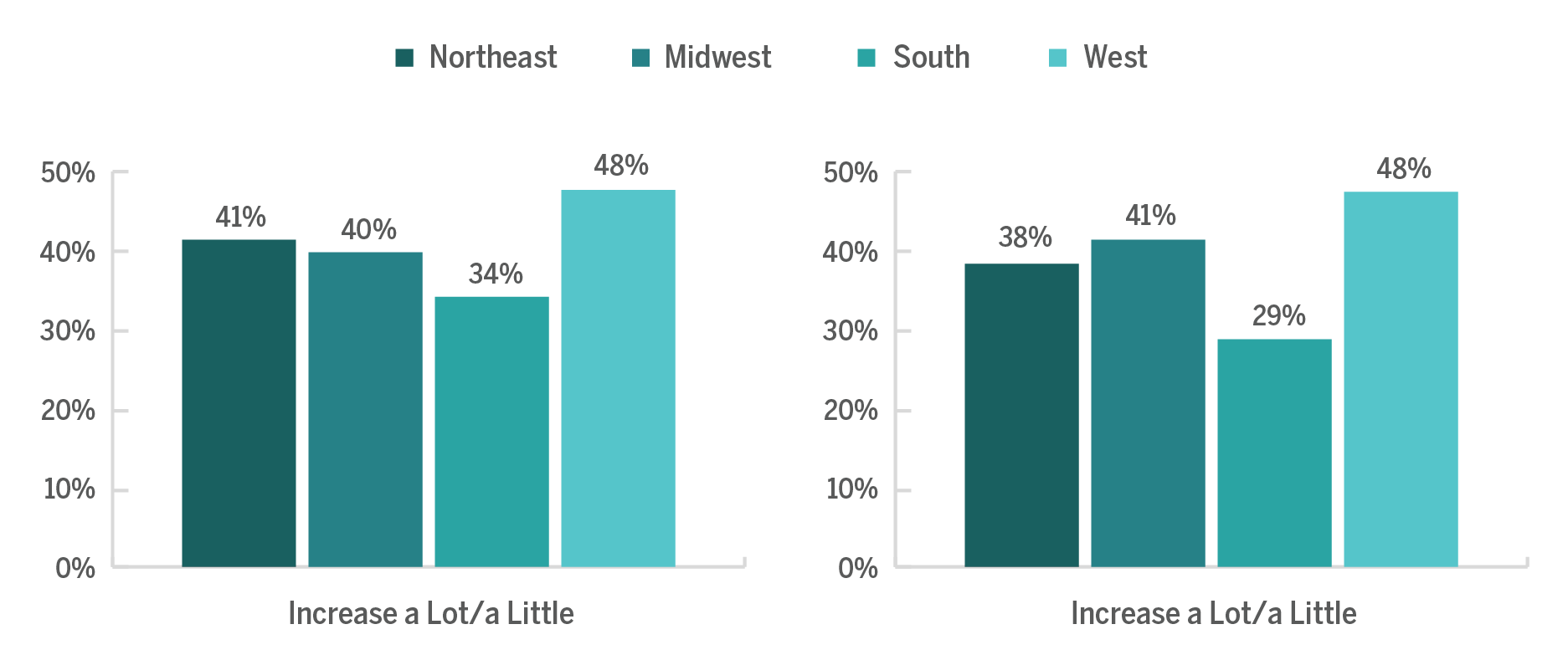
Given these results, the benefit of cooperation between the United States and Asia in tackling climate change does not translate to everyone consistently. In particular, these opinions fall on demographic groups such as politics, race, education and geography. It is also worth noting several trends demonstrated in this survey were unexpected. Although the difference in political affiliation is significant, it is not as stark as expected. On the other hand, the age demographics poll is surprising, as there is an insignificant difference among the age groups for cooperation to fight climate issues. Last but not least, when including China, the overall support from all the demographics declines. This is expected, considering the geopolitical issues between the United States and China. However, since the two countries are the biggest carbon polluters, it is surprising the support for more cooperation with China is less compared to other Asian countries.
Climate change is an issue to be addressed collectively and collaboratively among developed and developing countries. However, the term climate change nowadays is politically charged in the United States, causing opinions on the issue to fall on predictable political lines. Hence, without better communication, further collaboration to tackle this issue can be challenging. It is unclear from the study why this difference of opinion exists. However, the reason for this might stem from the misinformation regarding the ramifications of neglecting climate change, and the importance of US-Asia cooperation in addressing this issue. Nonetheless, this survey suggests public and private entities need to do better in communicating the importance of collective action in addressing climate change.
Ruivaldo F. Viana is a former participant of the Young Professional Program at the East-West Center in Washington D.C. He is a senior undergraduate student at Luther College studying Economics with a focus on Environmental Policy.
Asia Matters for America Poll Analysis is a series of short articles exploring the results of the recent survey by the East-West Center and conducted by the NORC at the University of Chicago on American perspectives on US-Asia relations. Authors examine a segment of the results from the report regarding trade, tourism, international students, immigration, human rights, national security, and sister city relationships to attempt to understand how Americans believe Asia matters to their state.
[1] Elites: For the purposes of this survey "Elites" is defined as elected and appointed officials, bureaucrats, and business leaders. 1,446 people representing these three sub-categories answered the survey.
[2] Please refer to the map on page 4 of the report.